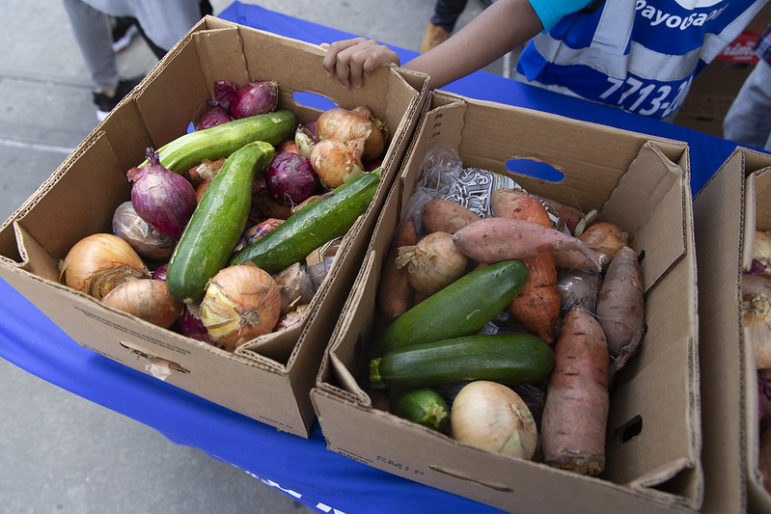“Sustainable food justice legislation must center food rescue efforts and make it a standard that all food-producing and handling businesses must meet.”

John McCarten/NYC Council
A box of groceries at a food distribution event.“First we eat, then we do everything else,” the late trailblazing food writer MFK Fisher observed over the course of her storied career. Fisher viewed food as a gateway to community, but also recognized that the plate of food available to you as a form of destiny. For over 25 percent of New York City residents, those plates are often bare and they live in a state of uncertainty as to when their next plate will be filled. This state of uncertainty is known as food insecurity.
The most galling aspect of food insecurity is its utter senselessness. We live in a world where one-third of the food supply is wasted each year. We live in a country where, according to Feeding America, 40 percent of edible food (over 100 billion pounds) goes to waste each year. We live in a city where 68 percent of discarded food is still edible—more than enough to feed the two-million residents grappling with food insecurity many times over.
So if food insecurity in New York City—and the United States—is not due to food scarcity, what is its root cause? In part, it owes to a lack of awareness on how to donate food; in part, it’s a wrongly held belief that businesses are liable should someone fall ill to donated food (businesses and individuals are exempt from liability by the Bill Emerson Good Samaritan Act, which was strengthened in 2022 by the Food Donation Improvement Act).
But the most significant causes are a lack of government regulation and coordinated logistics to transport the food from the donor to the donee. Food rescue, the practice of collecting edible food that would have otherwise gone to waste from restaurants, grocers, and other food-producing and selling establishments, is a vital tool in combating food insecurity.
Businesses with excess food, of which there are countless in New York City, must establish protocols to make their excess food available to nonprofits, shelters, low-income public housing tenant associations, and mutual aid organizations. Similarly, the City Council must pass legislation that requires food businesses to have food donation partners in the same way these businesses must meet a host of other requirements to be in compliance with health and safety regulations.
Sustainable food justice legislation must center food rescue efforts and make it a standard that all food-producing and handling businesses must meet. What many people fail to grasp—what MFK Fisher understood 50 years ago—is that effective food justice policy is good public health policy, as food insecurity is associated with a wide range of health issues, including higher risks of birth defects, anemia, cognitive problems, asthma, as well as increased risk of mental and behavioral health problems.
It’s good environmental policy, as food waste accounts for 8 to 10 percent of all greenhouse gas emissions; it’s good criminal justice policy, as a 1 percent rise in food insecurity has been associated with a 10 percent rise in violent crime; it’s good education policy, as food insecure-children suffer far higher rates of developmental delays, as well as school absenteeism; it’s good economic policy, as food insecurity costs our nation over $160 billion annually due to the combination of lost economic productivity, the rising costs of poor education outcomes, avoidable healthcare costs, and the cost of assistance programs to keep families fed.
Most of all, it’s good human rights policy.
Everything begins with what’s on our plates, and the very least we all deserve is the promise and security of a full, nutritious meal. By requiring food-producing and handling businesses of all sizes to designate food donation partners to rescue excess food, we can improve quality of life outcomes in every dimension of human experience.
Douglas Silver is the executive director of Gotham Food Pantry, a nonprofit that advances food justice by establishing food rescue operations in communities of high need. Diana Ayala is deputy speaker of the New York City Council and chair of the General Welfare Committee, and a fervent advocate for food rescue.









One thought on “Opinion: Food Rescue is the Key to Solving Food Insecurity”
While this article is full of good suggestions, to me the main way to combat food insecurity is to make sure that 1) everyone who is eligible for SNAP/food stamps receives them; 2) that the SNAP grant is raised to levels where it will actually pay for a healthy and varied diet; 3) that the federal government brings back public assistance as an entitlement and cancels the so-called welfare reform of the Clinton administration. The welfare grant established under the New Deal was probably never quite enough but it provided originally for food, rent, clothing, furniture, school supplies, etc. – it actually was a safety net. Food insecurity cannot be eliminated by only seeing that we stop wasting so much, but I agree that that is important too.